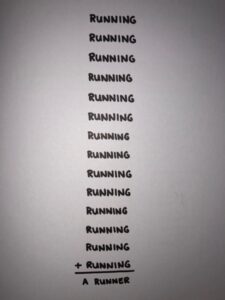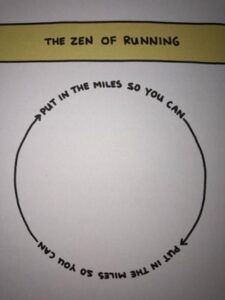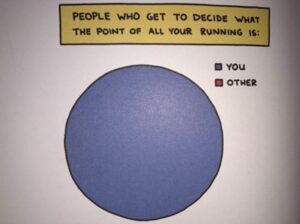The Being and the Doing
A Review of Brendan Leonard’s I H♡TE RUNNING and You Can Too
by Scott F. Parker
Maybe I should consider it a sign. I was walking by a table of books at a church fundraiser when the word running caught my eye. Stopping, I read the full title, I H♡TE RUNNING and You Can Too: How to Get Started, Keep Going, and Make Sense of an Irrational Passion. It looked, from premise to design, a little cute for my tastes. But one term in the subtitle intrigued me: irrational passion. It is one of the motivating concerns of this column to make sense of precisely that. Plus, the book was $1, and it would go to the church.
It didn’t take me long to realize that, assumptions be damned, Brendan Leonard is my kind of running writer: “This is not a how-to book or a memoir of a very fast person who has stood on podiums at the finish lines of races. It will not tell you how to train for a race, how to eat during, before, or after running and/or racing, or what kind of shoes to buy or clothes to wear, or what kind of stretches to do before or after running.” Pausing briefly to remember that some fast people write great memoirs, what I really want to say here is Amen. When it comes to reading about running, give me the intangibles every time.
But Leonard is being slightly ironic in his disclaimer. I H♡TE RUNNING most definitely is a how-to book; it’s just not about how to run a certain way or toward a certain outcome. It’s more elemental than that — it’s actually about how to be a runner. To wit:
Isn’t it more complicated than that? Not really. As Leonard explains, “At some point, every person was running zero miles per week.” Like Lao Tzu before him, Leonard recognizes wisdom disguised as the perfectly obvious: the way to get from zero to more than zero is to start. It’s impossible to argue against such clear insights. But the point isn’t to nod your head, it’s to take to heart.
Leonard challenges our conceptions of what it means to run so that we will be liberated to run. Here he is quoting Bart Yasso, the former chief running officer of Runner’s World: “I often hear someone say, ‘I’m not a real runner.’ We are all runners; some just run faster than others. I have never met a fake runner.” If you’re inclined toward ordinary language philosophy, you’ll see right away what Yasso and Leonard are up to. So many of us are insecure about our status as runners. Are we real runners? But we don’t stop think to about the implied contrast of real in that question. Do we mean that we are slow runners? That we are occasional runners? That we haven’t ever run marathon? Maybe we are slow, maybe we don’t run every day, maybe we max out at three miles. But these are just three ways of modifying what we are: runners.
This might start out as semantic, but one of Leonard’s key psychological insights is that it quickly becomes ontological. Noticing what words mean and using them precisely can produce a change in our self-conception. And that change in self-conception can propagate quickly in behavior. If I am a runner… I run. Or here is one of Leonard’s helpful charts:
The question then becomes, Why be a runner? Why run?
To this, Leonard offers several answers. There is the undeniable: “Either you think doing hard things is worth it to some extent, or you don’t.” The inspirational, by way of Alex Lowe: “‘The best climber in the world is the one who’s having the most fun.’ I think that ethos can apply to anything we do, including running.” The realistic: “Yes, I hate it most of the time, but maybe once during every run, I have a few seconds, or a minute or two, where I find myself thinking, ‘You know, this isn’t so bad.’” Different runners will lean into different reasons. And perhaps reasons is the wrong concept to apply here. We run because running is in our nature. We can but don’t need to tell a story about how it got in our nature. It’s enough just to notice that it’s there. If you do, the rest follows:
Scott F. Parker is the author of Run for Your Life: A Manifesto and The Joy of Running qua Running, among other books. His writing has appeared in Runner’s World, Running Times, Tin House, Philosophy Now, the Believer, and other publications. He teaches at Montana State University and is the nonfiction editor for Kelson Books.





